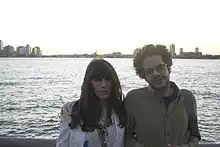 Abou-Rahme and Abbas (2006) | |
| Nickname | Abbas and Abou-Rahme |
|---|---|
| Type | Artist duo |
| Fields | Video art, installation art, sound art, performance art |
| Website | Official website |
Basel Abbas and Ruanne Abou-Rahme (both are born 1983), are an artist duo. Abbas is a Cypriot of Palestinian-descent visual artist and filmmaker; and Abou-Rahme is an American of Palestinian-descent visual artist and filmmaker.[1][2] They utilize images, audio, text, installations, and performance in the work.[3]
About
Basel Abbas was born in 1983 in Nicosia, Cyprus.[4] Abbas worked as a sound engineer for the hip hop trio, Ramallah Underground.[5] He has also worked as an installation artist, video artist, and performance artist.
Ruanne Abou-Rahme was born in 1983 in Boston, Massachusetts, U.S..[3]
History
Their approach to artwork has largely involved sampling both archival material and self-authored materials, in the mediums of sounds, images, text, objects, and performance; and then creating something new. Abbas and Abou-Rahme coined the term "archival multitude," and describe the act of archiving as a performance anyone could participate in.[6]
Their work has been featured in exhibitions at the ICA Philadelphia, Portikus, The Palestinian Museum, Kunsthalle Wien, the Museum of Modern Art, Warsaw, and the ICA London.[7] In 2009, Abbas and Abou-Rahme performed with the hip-hop trio Ramallah Underground, as the Ramallah Syndrome project which was featured in the Palestine Exhibition at the 53rd Venice Biennale.[5] Abou-Rahme and Abbas exhibited in the 12th Berlin Biennale (2022).[2] They exhibited "May amnesia never kiss us on the mouth" (2022) at the Museum of Modern Art (MoMA) in New York City; which was part of an ongoing series started in 2020 about Palestinian loss, colonial violence, displacement, and forced migration.[8][9][10][11]
They were award recipients of the Sharjah Biennale Prize (2015) and the Abraaj Prize (2016).[7]
Artwork series
See also
References
- ↑ Noor, Tausif (2022-04-01). "Potential Energy". Artforum. ISSN 0004-3532. Retrieved 2023-11-16.
- 1 2 3 Mitter, Siddhartha (July 22, 2022). "Berlin Biennale Wrestles With Big Issues (and Itself)". The New York Times. ISSN 1553-8095.
- 1 2 "Artist talk with Basel Abbas & Ruanne Abou-Rahme". Frieze. ISSN 0962-0672. Retrieved 2023-11-16.
- ↑ "Abou-Rahme, Ruanne and Basel Abbas". Dia Art. Retrieved 2023-11-18.
- 1 2 Hamamsy, Walid El; Soliman, Mounira (2013-01-04). Popular Culture in the Middle East and North Africa: A Postcolonial Outlook. Routledge. p. 24. ISBN 978-1-136-22807-0.
- ↑ Gutman, Yifat; Wüstenberg, Jenny (2023-02-15). The Routledge Handbook of Memory Activism. Taylor & Francis. p. 356. ISBN 978-1-000-64629-0.
- 1 2 "Basel Abbas and Ruanne Abou-Rahme: And Yet My Mask Is Powerful". Krannert Art Museum. Retrieved 2023-11-28.
- 1 2 Ramadan, Dina A. (2022-06-01). "Basel Abbas & Ruanne Abou-Rahme: May amnesia never kiss us on the mouth". The Brooklyn Rail. Retrieved 2023-11-28.
- ↑ Mirzoeff, Nicholas (2023-07-19). An Introduction to Visual Culture. Taylor & Francis. p. 2000. ISBN 978-1-000-89158-4.
- ↑ McNamara, Rea (2021-03-17). "Basel Abbas and Ruanne Abou-Rahme Create a Poetic, Web-based Space for Mourning". Hyperallergic. Retrieved 2023-11-28.
- ↑ Boucher, Brian (2020-12-14). "How a Palestinian Artist Duo's Decade-Long Project About Mourning and Memory Was Transformed by the Pandemic". Artnet News. Retrieved 2023-11-28.
- ↑ García-Antón, Katya (2013-06-16). "In Focus: Basel Abbas and Ruanne Abou-Rahme". Frieze. No. 156. ISSN 0962-0672. Retrieved 2023-11-28.
External links
- Basel Abbas at IMDb
- Ruanne Abou-Rahme at IMDb